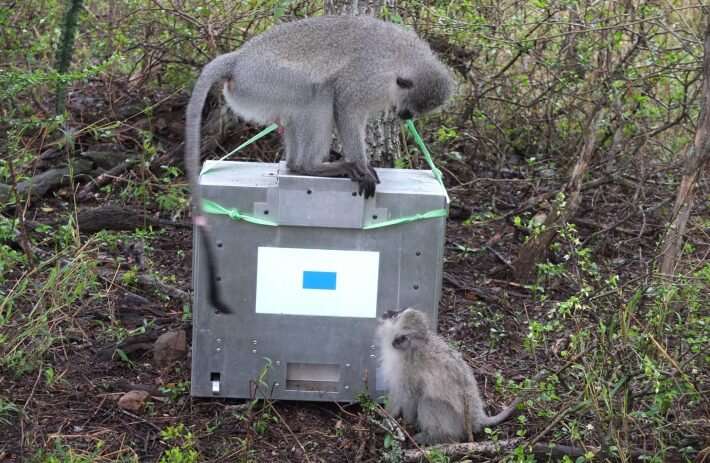Touchscreen device proves useful for studying wild primates

A new study from a team at the University of Lausanne, Switzerland, explores the use of touchscreen devices in experiments conducted on wild primates, with the aim of reducing the need for captive animals.
Touchscreen devices have already proven useful for studies of primates in captivity, however for the first time, they have been proven effective for the study of primates living in the wild. The results found by Erica van de Waal’s team at the University of Lausanne (UNIL) are the outcome of over two years of observation of vervet monkeys, as well as comparative data collection with groups of both wild animals and those living in captivity.
The fieldwork element of the study took place South Africa, the natural habitat of the vervet monkey. Helped by several assistants, Tecla Mohr, one of the papers co-first authors, carefully selected the monkeys she was going to follow as well as which cognitive tests she would present to them. The touchscreen devices used in the research displayed a blue square, which would be connected to a food reward dispenser.
The learning task (which was considered easy) consisted of the monkeys touching a square, which changed position each time on the monitor. If successful, the monkeys were then rewarded with a few kernels of corn—a particular favorite of theirs. The learner must understand and connect their movements with the resulting reward.

A long process of adjustment was experienced by the team as the cameras and other pieces of equipment used in the experiments were designed for larger, captive animals and thus had to be adjusted to suit the smaller, wild primates.
Mohr explains, “Some of the things we did to make the system work included reducing the size of the screen and changing the size of the symbols, finding the best possible location away from predators and finding a way to attach the screens to the trees and connect them to the internet.” Long hours were spent scrutinizing each monkey to be able to recognize each of them as well as the tasks they could perform.
One of the things demonstrated by Mohr and her colleagues through their experiments is that age and sex of wild vervet monkeys influences their participation rates. For example, adult females tend to be more involved than their male counterparts, possibly attributed to them being more assertive.

Describing the impact of the project, Erica van de Waal, the project’s principal investigator said “Using touch screens to examine cognitive abilities in wild populations will make it possible to advance the understanding of cognition in non-human primates more rapidly.”
Alongside van de Waal, the UNIL team plan to collaborate with Swiss innovation and research center, The Sense, to optimize the system. This optimization aims to improve the ease of which research can be conducted, thus eventually eliminating the need to animals to be held in captivity. It also opens the door to multisensory communication experiments, notably by presenting the monkeys with the faces and cries of their groupmates or by using virtual reality games.
The study is published in the Journal of Animal Ecology.
More information:
Rachel A. Harrison et al, Lab cognition going wild: Implementing a new portable touchscreen system in vervet monkeys, Journal of Animal Ecology (2023). DOI: 10.1111/1365-2656.13857
Citation:
Touchscreen device proves useful for studying wild primates (2023, January 16)
retrieved 17 January 2023
from https://phys.org/news/2023-01-touchscreen-device-wild-primates.html
This document is subject to copyright. Apart from any fair dealing for the purpose of private study or research, no
part may be reproduced without the written permission. The content is provided for information purposes only.
For all the latest Science News Click Here
For the latest news and updates, follow us on Google News.

